Thursday, September 11, 2025. Annette’s Roundup for Democracy.
Today is 9/11.
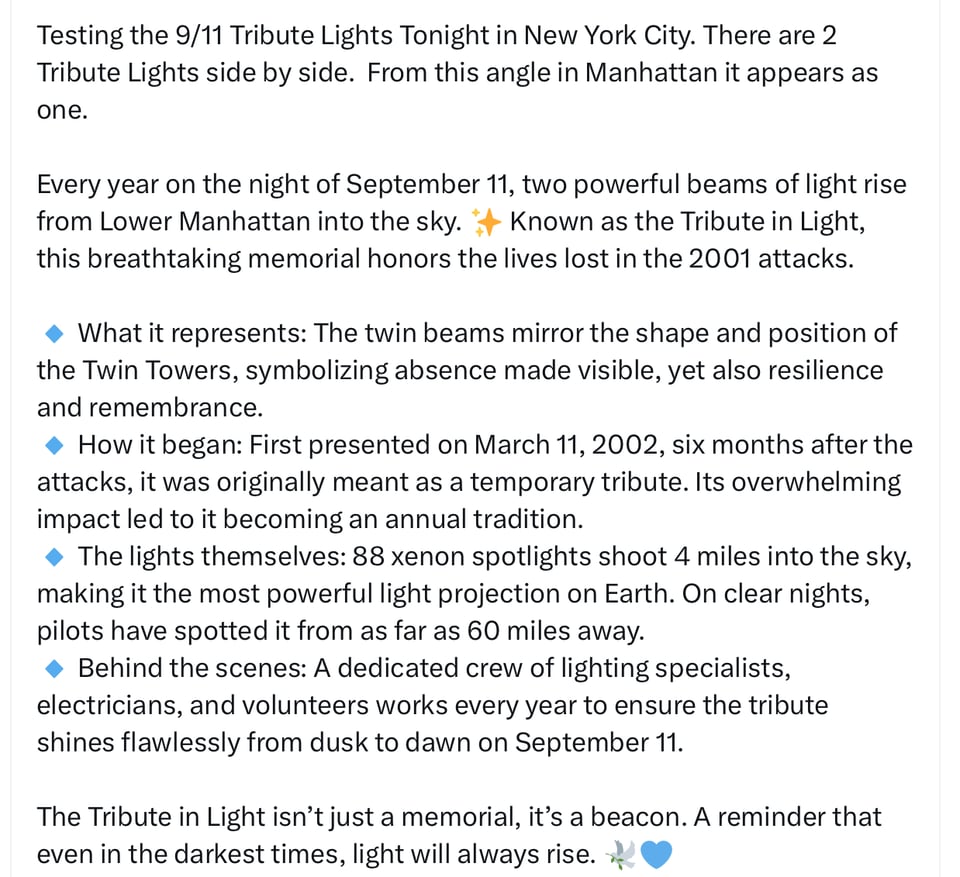

Kamala’s book is slated to be published on Sept. 23.
In the meanwhile, here’s the excerpt from The Atlantic.
The first excerpt from 107 Days By Kamala Harris
Editor’s Note: The biggest surprise in Kamala Harris’s forthcoming account of her rough-and-ready, intense, and absurdly condensed campaign for president, 107 Days, may be that it is filled with surprises. I read it last week, expecting lawyerly calibration and discretion. This careful Harris is present, but so too is another Harris: blunt, knowing, fervent, occasionally profane, slyly funny. As you will see in the following excerpt—and throughout this newsworthy book—she no longer seems particularly interested in holding back.
107 Days begins with the events of July 21, 2024, the very late date on which Joe Biden told his vice president, and the world, that he would exit the presidential race. The chapter below details the events of July 24, as well as some of Harris’s acute observations about the absurdity and unprecedented nature of that political moment. 107 Days will be released by Simon & Schuster on September 23.
— Jeffrey Goldberg
THE CONSTANT BATTLE
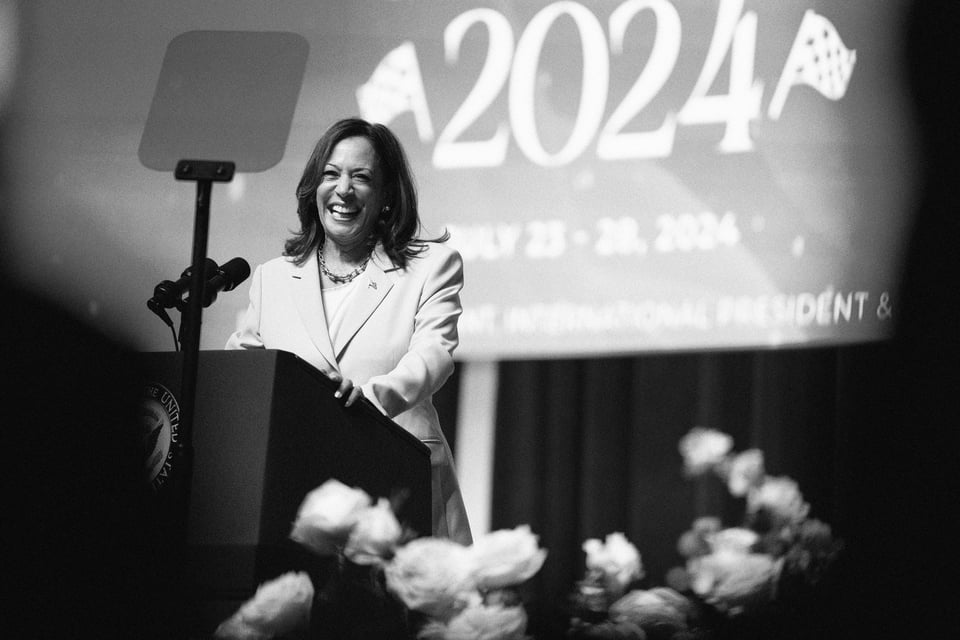
The first stop on the day’s calendar had been planned months earlier. At a meeting in the Oval Office discussing her work uplifting Black executives and entrepreneurs, Dr. Stacie NC Grant had invited me to address the annual gathering—the Grand Boulé—of her sorority, Zeta Phi Beta.
Now I was in Indianapolis, looking out over a convention center packed with 6,000 powerful women in dark-blue dresses and white jackets.
I’m a member of a different sorority, Alpha Kappa Alpha, the first Black women’s Greek-letter organization, founded at Howard University in 1908. But these women are my sisters, too. We’re all part of the Divine Nine, the Greek organizations founded when segregation was law in the South and standard practice in the North. W. E. B. Du Bois and Thurgood Marshall were early members of the first Black fraternity, Alpha Phi Alpha, founded at Cornell University in 1906. The Divine Nine has been an engine of uplift for generations of Black college men and women, instilling a love and celebration of excellence, philanthropy, and service to all mankind. My Divine Nine family would show up for me throughout the campaign. That day I was so pleased to see the young president of Phi Beta Sigma, Chris V. Rey, and the esteemed president of Delta Sigma Theta, Elsie Cooke-Holmes.
Throughout my career I’ve maintained that people in positions of power must be required to ask of themselves: Who am I not hearing from? Then make it their business to seek those folks out. I came to the White House knowing that the people in that building needed to hear from a wider range of voices.
As vice president I’d been given several roles by Joe Biden. But one role I created for myself was building up the diverse coalition that our party encompassed. I made it my business to get out there and make sure that no community was overlooked, especially those that had been taken for granted in the past. Black women, the Democrats’ staunchest, most reliable voting bloc, was one such community. The boulé in Indianapolis was one of a dozen Divine Nine gatherings I’d addressed since taking office.
On this day there was a new energy in the room as I walked onto the stage. A Black woman was slated to be the Democratic nominee for president. It was us. And everyone there understood what it meant: that this would be a journey of both joy and pain. I was in a room full of people with whom, because of our shared experience, certain words did not need to be said. There is an emotion that comes from being in a place where people see you, support you, know you. The kindness and the love in that room penetrated the armor I usually wore, armor I’d need to put back on as soon as I left that room.
The biggest applause came when I started to say what I would do to restore the rights of Roe v. Wade.
“When I am president—”
A roar erupted that drowned out the rest of that sentence.
That roar told me they could see it. Clearly, for the first time. This could be, and it should be. It was not because of gender or because of race, but despite those things.
I thought, as I often did, of Shirley Chisholm, and I know they did, too. The first Black woman elected to the U.S. Congress and the first woman to run for our party’s nomination. She had blazed the path, and now I was standing on it.
From Indianapolis we flew on to Houston to meet with emergency-management staff and get a briefing on recovery efforts after the devastation of Hurricane Beryl. The Category 1 hurricane’s eyewall had slammed Houston, bringing down power lines and leaving vulnerable people without air-conditioning or water during triple-digit heat indexes. At least 20 souls had died. The economic damage—in the billions—was still being reckoned.
These kinds of briefings are sadly familiar to me. As district attorney, I’d witnessed the aftermath of Hurricane Katrina. As senator, I’d been to Puerto Rico after Hurricane Maria and I’d toured the communities in my home state that had been ravaged by wildfires. It was heartbreaking to see the scale of these losses and the exhausted faces of individuals standing in the ruins of a lifetime’s work, a lifetime’s dreams. It was infuriating to see how predators swarmed like cockroaches, price gouging, spreading misinformation. But it was also inspiring to talk to the first responders who ran toward danger, sometimes helping strangers even as their own homes were at risk. And then there were the regular people who stepped up to help in whatever way they could: collecting toiletries, making sandwiches, organizing clothing drives.
In my life I’ve seen over and over that it is often the people with the least who give the most.
As I shook hands and thanked the police and emergency workers one by one, in each I saw a hero. The kind of person who answered a calling with a sense of duty to the well-being of people they’ve never met. A reporter in the press pool shouted a question about Biden’s upcoming speech. It was just after 5 p.m. in Houston, and the president would be addressing the nation from the Oval Office later that evening.
I watched it at the hotel that night. It was a good speech, drawing on the history of the presidency to locate his own place within it. But as my staff later pointed out, it was almost nine minutes into the 11-minute address before he mentioned me.
“I want to thank our great vice president, Kamala Harris. She is experienced, she’s tough, she’s capable. She’s been an incredible partner to me and leader for our country.”
And that was it.
I am a loyal person.
During all those months of growing panic, should I have told Joe to consider not running? Perhaps. But the American people had chosen him before in the same matchup. Maybe he was right to believe that they would do so again.
He was, by some measures, the most consistently underestimated man in Washington. He’d been right about his tactics for pushing his agenda through a resistant Congress.
It was just possible he was right about this, too.
And of all the people in the White House, I was in the worst position to make the case that he should drop out. I knew it would come off to him as incredibly self-serving if I advised him not to run. He would see it as naked ambition, perhaps as poisonous disloyalty, even if my only message was: Don’t let the other guy win.
“It’s Joe and Jill’s decision.” We all said that, like a mantra, as if we’d all been hypnotized. Was it grace, or was it recklessness? In retrospect, I think it was recklessness. The stakes were simply too high. This wasn’t a choice that should have been left to an individual’s ego, an individual’s ambition. It should have been more than a personal decision.
Many people want to spin up a narrative of some big conspiracy at the White House to hide Joe Biden’s infirmity. Here is the truth as I lived it. Joe Biden was a smart guy with long experience and deep conviction, able to discharge the duties of president. On his worst day, he was more deeply knowledgeable, more capable of exercising judgment, and far more compassionate than Donald Trump on his best. But at 81, Joe got tired. That’s when his age showed in physical and verbal stumbles. I don’t think it’s any surprise that the debate debacle happened right after two back-to-back trips to Europe and a flight to the West Coast for a Hollywood fundraiser. I don’t believe it was incapacity. If I believed that, I would have said so. As loyal as I am to President Biden, I am more loyal to my country.
I was well aware of my delicate status. Lore has it that every outgoing chief of staff always tells the incoming president’s chief of staff Rule No. 1: Watch the VP. Because I’d gone after him over busing in the 2019 primary debate, I came into the White House with what we lawyers call a “rebuttable presumption.” I had to prove my loyalty, time and time again.
When Fox News attacked me on everything from my laugh, to my tone of voice, to whom I’d dated in my 20s, or claimed I was a “DEI hire,” the White House rarely pushed back with my actual résumé: two terms elected D.A., top cop in the second-largest department of justice in the United States, senator representing one in eight Americans.
Lorraine Voles, my chief of staff, constantly had to advocate for my role at events: “She’s not going to stand there like a potted plant. Give her two minutes of remarks. Have her introduce the president.”
They had a huge comms team; they had Karine Jean-Pierre briefing in the pressroom every day. But getting anything positive said about my work or any defense against untrue attacks was almost impossible.
An example: In 2021, I was dispatched to the Élysée Palace to help reset our tattered relationship with France after we signed the Australia-U.K.-U.S. security pact. Australia had agreed to buy submarines from France but scrapped that contract when we and the U.K. agreed to supply Australia with nuclear subs under the new AUKUS agreement instead. This had caused tremendous friction.
In our meeting, Emmanuel Macron and I warmed the chill by focusing on our many areas of cooperation, such as space exploration, climate change, transatlantic security, cybersecurity, the Sahel, and the Indo-Pacific.
On that trip, I was invited to visit the renowned Pasteur Institute, where my mother had worked on mRNA research related to breast cancer. I was speaking informally with the scientists there about how I wished politicians would more closely follow the scientific method: testing a hypothesis and adjusting according to results, rather than coming in with the Plan, as if they had all the answers up front.
I said “the Plan” with exaggerated emphasis and air quotes. Fox News, the New York Post, and Newsmax went wild, claiming I’d faked a French accent. This was total nonsense, but the White House seemed glad to let reporting about my “gaffe” overwhelm the significant thaw in foreign relations I’d achieved.
Worse, I often learned that the president’s staff was adding fuel to negative narratives that sprang up around me. One narrative that took a stubborn hold was that I had a “chaotic” office and unusually high staff turnover during my first year.
The plain fact is many people who come to work with a new administration in the White House haven’t done it before. It’s a job unlike any other, and not every person, no matter how talented in their former position, can step up into such a high-stress, round-the-clock role. Others find they just don’t want a job that doesn’t pay particularly well, takes a massive toll on family, and rules out anything resembling a normal life. I’m not going to keep people on who can’t thrive in their jobs—it’s not fair to them and it’s not good for the country.
So the first year in any White House sees staff churn. Working for the first woman vice president, my staff had the additional challenge of confronting gendered stereotypes, a constant battle that could prove exhausting.
I was the first vice president to have a dedicated press pool tracking my every public move. Before me, vice presidents had what’s called a “supplemental pool,” as the first lady does, covering important events. Because of this constant attention, things that had never been especially newsworthy about the vice president were suddenly reported and scrutinized.
And when the stories were unfair or inaccurate, the president’s inner circle seemed fine with it. Indeed, it seemed as if they decided I should be knocked down a little bit more.
“The VP should take on irregular migration.”
From March 2021, my assignment was to attack the root causes of the misery that was driving people from their homes and villages in Guatemala, Honduras, and El Salvador. Because I’d prosecuted cartels and human traffickers from the Northern Triangle, I was up to speed on the region and its problems, and had ideas about the kinds of investments and other interventions that over time would reduce irregular migration, help to bring stability, and offer people a safer future in their own community.
Most people don’t want to leave home. They don’t want to leave their grandmother, their church, their friends, their language. And when they do, it is usually for one of two reasons: they fear for their lives, or they can’t make a living. Much of that region is rural, and farmers are increasingly hit by climate events such as floods and droughts. If you can no longer grow food where you are, and if there’s no other livelihood, you will leave, because there’s simply no choice. Corruption and gangs thrive when there are limited resources.
When Republicans mischaracterized my role as “border czar,” no one in the White House comms team helped me to effectively push back and explain what I had really been tasked to do, nor to highlight any of the progress I had achieved. I won commitments of $5.2 billion in new investments by private companies for the region. I had already seen almost a billion dollars of that money deployed, thanks to enthusiastic partners such as Mastercard, Microsoft, and Nespresso.
I held numerous bilateral meetings with leaders throughout the region, especially with President Alejandro Giammattei in Guatemala, and later his successor, President Bernardo Arévalo. I had multiple calls with Giammattei, warning him that I expected free and fair elections; I sent my national security adviser Phil Gordon to reinforce the message in person; and I publicly supported Arévalo once the election was called.
I met with activist groups fighting against corruption and for human rights in El Salvador, Guatemala, and Honduras. Cabinet members pitched in: Tom Vilsack at the Department of Agriculture accessed resources to train farmers in the latest methods to increase yields.
I worked closely with Mexico’s president, Andrés Manuel López Obrador, and later his successor, President Claudia Sheinbaum, on our mutual border concerns. The investment I was bringing was a bargaining chip with regional governments to crack down on corrosive levels of corruption. These American companies, I told them, would not invest unless real steps were taken. The investments I encouraged have connected communities to the internet and brought people into the formal financial system, creating jobs and opportunity.
In the locations where I was able to bring new enterprises and greater stability, data showed it was working. Our investments had created 70,000 new jobs, reached more than a million people with training programs, and connected 2.5 million previously unbanked people with banking services and access to credit. These people were staying put. I wanted to get that good news out. But White House staff stalled. “Not yet. We need more data.” The story remained untold.
Instead, I shouldered the blame for the porous border, an issue that had proved intractable for Democratic and Republican administrations alike. Even the breathtaking cruelty of Trump’s family-separation policy hadn’t deterred the desperate. It was an issue that absolutely demanded bipartisan cooperation at an impossibly partisan, most uncooperative time.
No one around the president advocated, Give her something she can win with.
Then the Dobbs decision came down.
Here was a huge issue on which the president was not seeking to lead. Joe struggled to talk about reproductive rights in a way that met the gravity of the moment. He ceded that leadership to me. I initiated a national tour and rallied the outrage in red states and blue states alike. As well as big public events, I convened roundtables, starting out with 10 or 12 state legislators whom I would connect with resources in the Justice Department or Health and Human Services. Soon, advocates started attending, then health-care providers, then families affected by restrictive laws. There would be hundreds of people at these meetings, building a national coalition. All this work upended the narrative that we were doomed to a shellacking in the midterms. We defied historical precedent because of our efforts on this issue. (Since 1934, the president’s party has lost an average of 28 House seats and four Senate seats in midterm elections. We lost just nine seats in the House and retained control of the Senate.)
Joe was already polling badly on the age issue, with roughly 75 percent of voters saying he was too old to be an effective president. Then he started taking on water for his perceived blank check to Benjamin Netanyahu in Gaza.
When polls indicated that I was getting more popular, the people around him didn’t like the contrast that was emerging.
In Selma, Alabama, at the commemoration of Bloody Sunday, when civil-rights marchers were attacked and beaten once they’d crossed the Edmund Pettus Bridge, I gave a strong speech on the humanitarian crisis in Gaza. Desperate people had been shot when they swarmed a food truck, and I spoke of families reduced to eating leaves or animal feed, women prematurely giving birth with little or no medical care, and children dying from malnutrition and dehydration. I reiterated my strong support for Israel’s security and called on Hamas to release the hostages and accept the cease-fire agreement then on the table. I also called on Israel for greater access to aid. It was a speech that had been vetted and approved by the White House and the National Security Council. It went viral, and the West Wing was displeased. I was castigated for, apparently, delivering it too well.
Their thinking was zero-sum: If she’s shining, he’s dimmed. None of them grasped that if I did well, he did well. That given the concerns about his age, my visible success as his vice president was vital. It would serve as a testament to his judgment in choosing me and reassurance that if something happened, the country was in good hands. My success was important for him.
His team didn’t get it. (Excerpt, THE CONSTANT BATTLE,from 107 Days, By Kamala Harris)
New Mexico: the Land of Enchantment, Georgia O'Keeffe, Breaking Bad and now, free child care.
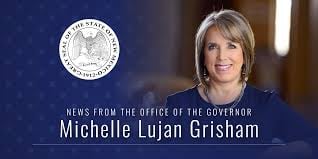
Beginning in November, it will be the first state in the nation to provide child care to all residents regardless of income, Gov. Michelle Lujan Grisham announced. The initiative is expected to save families $12,000 per child annually. (From the 19th)
Charlie Kirk, pure MAGA man, was assassinated tonight.
Trump and his followers want to blame Democrats for the violence of this nation.
Meanwhile, Trump and his administration fight gun reform and encourage more and more violent rhetoric and actions. Think tanks in DC. Think the renaming of the Department of Defense to the Department of War. Think the violent handling of immigrants he considers animals.
Trump and his cult think they have the right to kill people without law, without trial.
Trump thinks he has the right to choose who lives and who dies.👇
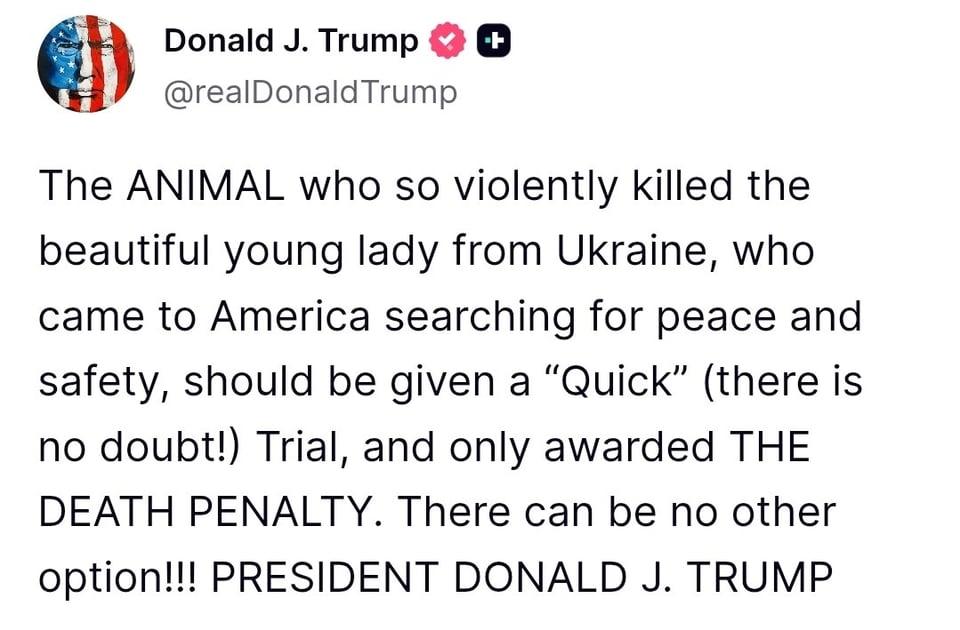
Hegseth, now Secretary of War, feels he too can pick who can live and who should die.👇
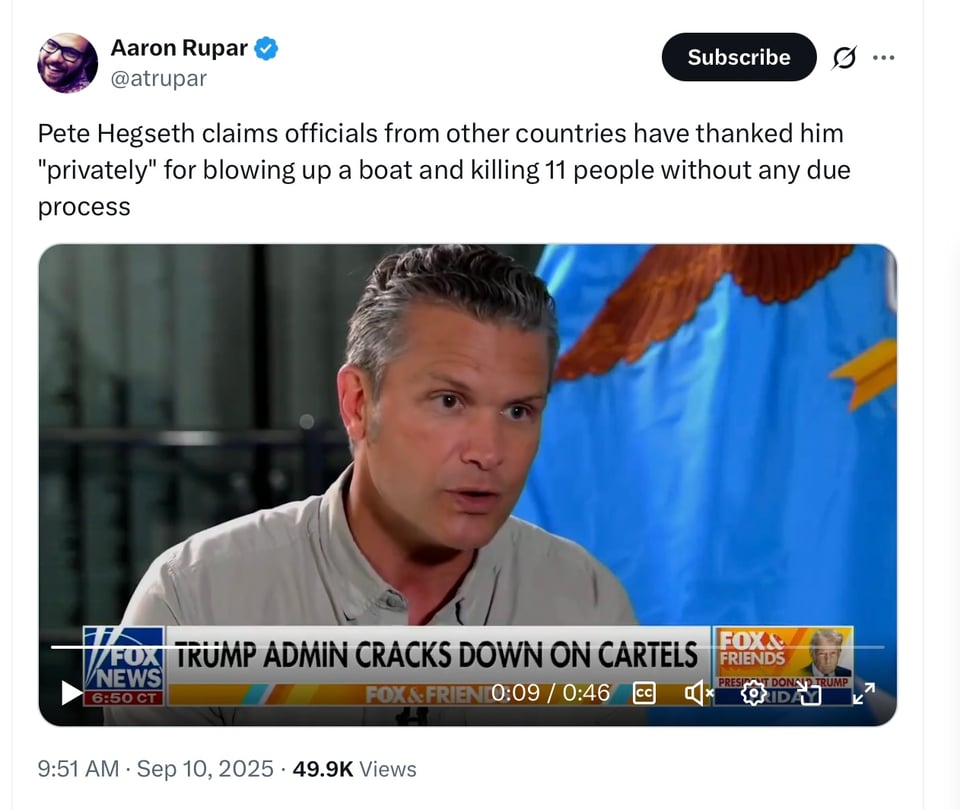
But when it comes to foreign policy and action, Trump was MIA.
Trump went to dinner instead (Joe’s Seafood, in case you hadn’t heard), got booed and waited to answer in the morning.👇

Trump delayed 12 hours before saying a word about Putin’s attack on Poland, and then this 👆 is what he said.
But tonight Trump is all anti-violence. One of his guys was its victim.
America is a sad country.
One more thing.
Remember what she, who could have been our President, said.

Repeating- America doesn’t like Trump.
A deeper dive into reactions.
Protesters Call Out Trump as He Dines Out in Washington
Mr. Trump made the short trek from the White House to Joe’s Seafood, Prime Steak & Stone Crab to show that his federal crackdown on crime in the nation’s capital was working.
President Trump ventured one-tenth of a mile beyond the gates of the White House for dinner on Tuesday night, only to be met almost immediately by protesters who called him “the Hitler of our time.”
Mr. Trump made the short trek from the White House to Joe’s Seafood, Prime Steak & Stone Crab to show that his federal crackdown on crime in the nation’s capital was working. But as he made his way through the restaurant, protesters began to heckle him.
“Free D.C.,” they shouted, according to videos posted on social media. “Free Palestine. Trump is the Hitler of our time.”
For Mr. Trump, the visit was supposed to be a victory lap.
“We’re standing right in the middle of D.C.,” Mr. Trump told reporters before going into the restaurant. “This was one of the most unsafe cities in the country. Now it’s as safe as anywhere in the country.”
But Mr. Trump remains deeply unpopular in Washington, and videos of the protesters confronting the president quickly ricocheted across social media.
A close confrontation with protesters is a relatively rare occurrence for Mr. Trump since taking office, as he has spent most of his time at the White House or at his private clubs in Florida, Virginia or New Jersey. But recently the president has seemed more willing to step out in public. On Sunday, he attended the men’s final of the U.S. Open in New York, where he drew boos and some cheers. On Thursday, he plans to attend the Yankees game in New York on the anniversary of the Sept. 11 attacks.
It was Mr. Trump’s first meal at a Washington restaurant since returning to the White House in January. During his first term, the president was a regular visitor to the Trump International Hotel, just down the street from the White House, but that hotel closed in 2022.
On Tuesday night, Mr. Trump was joined by Vice President JD Vance, Secretary of State Marco Rubio, Secretary of Defense Pete Hegseth and other top White House officials. Karoline Leavitt, the White House press secretary, said Mr. Trump and his aides ate crab, shrimp, salad, steak and dessert.
“The food was phenomenal and the service was fantastic,” Ms. Leavitt said.
The president deployed the National Guard to Washington last month as part of an effort to reduce crime, even though crime had been falling in the city. The White House has eagerly touted the number of arrests since Mr. Trump declared a crime emergency, though many of the arrests have been for minor offenses. The U.S. attorney’s office in Washington has had to downgrade or dismiss a number of cases after failing to secure indictments from grand juries. (New York Times).
Rubio, Hegseth, and Vance were with Trump for the dinner.
Trump is supposed to be going to the Yankee game on 9/11, though Charlie Kirk’s murder may affect that. If it happens, expect him to get the Bronx Cheer.
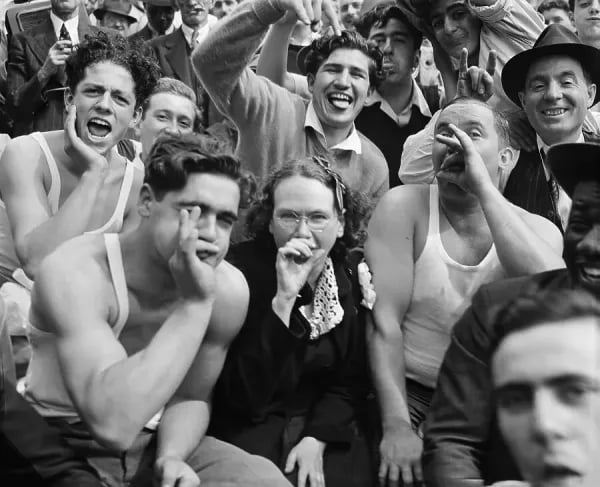
Republicans again protect Trump on Epstein.
This is really too much to bear.
After talking with Senate GOP leaders, Murkowski votes Yes, and kills the Schumer plan on the Epstein Files. Final vote 51-49. pic.twitter.com/4d8TfGzfTq
— Jamie Dupree (@jamiedupree) September 10, 2025
Mamdani shows his wit, and makes a point too.
Some very wealthy folks really are freaking out at the possibility that Mamdani may be the new Mayor of New York City.
Mamdani taps ‘Gilded Age’ star to read ‘freak-out’ reaction to him from NY’s megarich
Zohran Mamdani’s campaign is offering a rich response to a news story detailing how the very wealthy feel about the New York City Democratic mayoral nominee, tapping a star of “The Gilded Age” to perform a “dramatic reading” of the article.
In a video posted by Mamdani on Monday, Morgan Spector is seen dressed as his railroad tycoon character, George Russell, from the HBO historical drama that’s set in the late 19th century and follows the lives of New York’s megarich.
The 44-year-old actor then reads aloud selected passages from a New York Times story published last month headlined “How Are the Very Rich Feeling About New York’s Next Mayor?”
“August in the Hamptons: Ocean breezes. Oversubscribed Tracy Anderson classes. Parking woes. And this year, with a New York City mayoral election looming in the fall, a freak-out that the most sumptuous of summer staples hasn’t soothed,” Spector said in front of a background filled with books and lit candles.
“Even overpriced lobster salad can’t seem to make people out here feel better,” Spector said, reciting a political fundraiser quoted in the Times piece.
“The Hamptons is basically in group therapy about the mayoral race,” Spector said, again quoting the political fundraiser cited by the Times.
“In other words, the plutocrats are panicking,” Spector said, pulling from the same article.
Spector has praised Mamdani before, referring to him as a “fantastic candidate” before he officially clinched the Democratic nomination for New York mayor in July.
“He feels like a candidate who could have an amazing future as a left politician,” Spector told Rolling Stone.
President Trump has repeatedly ripped Mamdani, a New York state Assembly member who identifies as a democratic socialist, calling him a “communist lunatic.” (The Hill)
Have spare change. Do something good in the world!
Why Cody Renard Richard Created a Scholarship to Diversify the Backstage of Broadway
The scholarship is gearing up for its sixth cycle, giving $10,000 to theatre students who want to pursue a career behind-the-scenes.

The 2025 Cody Renard Richard Scholarship Cohort.
When stage manager Cody Renard Richard was first starting his career in New York, he remembered feeling alone. Even though he was working in an industry that emphasized community, he was also hyperaware of how, as a stage manager, he was often one of the only faces backstage that wasn't white.
"I think navigating New York, I'm an only child, I moved here not knowing many people. Navigating the business on my own was a fun challenge, but also isolating," he recalls feeling. That was why, in 2021, Richard (whose Broadway credits include the upcoming Ragtime revival) launched the Cody Renard Richard Scholarship, to help foster BIPOC students who want to pursue a career working backstage in theatre—such as in management, directing, or designing.
For me, it was really about providing space for folks so they didn't have to go through what I went through," says Richard. "And providing space for folks who were going through similar situations so we can all come together and talk about what's happening in these silos. So people know that they're not alone. So people know that there are other folks who look like them, going through the same thing at different universities."
The scholarship, which opens for its sixth round of applications October 1, provides students that are enrolled full-time at a university with $10,000, an all-expense-paid trip to New York with their scholarship cohort, and networking opportunities and work sessions with industry professionals.
Though the CRR scholarship has only been distributing funding for four years, the results have already manifested themselves. Fifty-five students have come through the program, which has distributed more than $400,000. Scholarship alums have gone on to work on shows such as Hamilton and Pirates! The Penzance Musical.
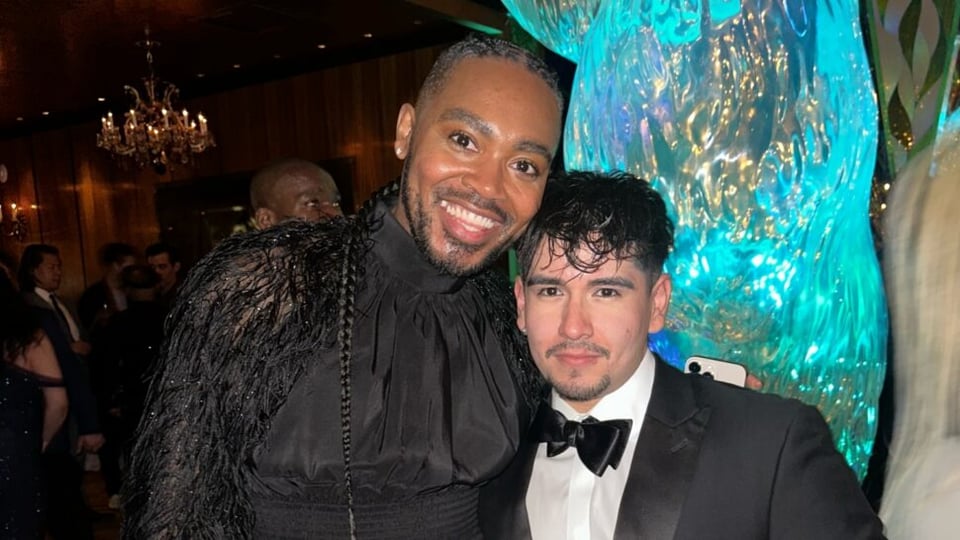
Cody Renard Richard and Moses Garcia.
Moses Garcia was studying directing at Carnegie Mellon University when he received the scholarship. Then through the program's network, Garcia was able to meet director Saheem Ali and became one of Ali's go-to associates. Garcia is now an associate director on Buena Vista Social Club on Broadway.
"At Carnegie Mellon, it was sort of like, everyone for themselves and 'good luck, and we'll see you whenever you've hit it big,'" says Garcia. "To have someone like Saheem to share my fears and really talk through the different challenges that I'm going through in terms of: Do I do this job? Do I not do this job? I'm feeling really burnt out right now, how do you take care of yourself? There's so many different parts of the industry that can't be taught in school, that you really are figuring out as you're launching [your career]. The deep connection that I have, both with Saheem and Cody, really ignited a fire in me."
As the theatre industry takes steps to diversify the faces onstage, these artists believe that offstage diversity is just as important. After all, directors are the ones overseeing the vision for a production while stage managers are the ones who have to speak up if any workplace issues arise. As stories that are being told onstage expand to include artists of many backgrounds, new conversations on Broadway have ensued on how to best support the telling of those stories—such as how to work with different hair types or how to make backstage more accessible to people with disabilities.
"One of the things I'm learning in my career is the positions off-stage have the most autonomy to disrupt the systems and structures that already exist," explains Garcia. "There are many times when I'm in rooms and I'm the middle person between the company [of actors]. And I'm also the middle person between general managers and producers. Having the knowledge of how both of those entities work, I'm able to uplift and shine a light on issues that either one of those parties might not quite understand." That ability to understand multiple perspectives is even more important in an environment like Buena Vista Social Club. Even though it's a show with a focus on Cuban culture, different races are represented backstage and onstage, as well as different languages. "Everyone's identity and lived experience is carried with them and manifests in different ways. So, it's really just about leading with curiosity, to find find a point of connection, to really support people and really know that you're in their corner."
Currently, with the Trump Administration tamping down on diversity programs, and many corporations walking back their own inclusion programs in response, a program like the CRR Scholarship has only increased in importance.
Says Garcia: "The people that are stewards of equity, diversity, and inclusion, their positions have never been more important, because so many people are rolling back on what they once said that they were for. And we're even seeing it in our industry, where we're letting people slide by and re-enter the industry—when a couple years ago, the industry collectively said, 'No, we're not going to uphold these antiquated ideologies anymore' ... Just because we're under a new, scary administration that is threatening all of this, it shouldn't mean that we're turning our backs on one another just because it's convenient or because we're operating out of fear."
Despite the wider cultural backsliding on diversity, Richard is unfazed. He still feels an intense calling to advocate for representation behind the scenes. What currently gives him motivation are the students who have gone through the CRR scholarship, entered the industry, and becoming small stewards of change in their own shows. To him, the scholarship isn't just about training skilled artists, it's about creating "the best humans we can."
"This work is essential," he says passionately. "In order for students to reach their full potential, they need to be connected with people who look like them. They need to be given these resources. They need the funds in order for them to even make it through school so they can even try to reach their full potential." As a parting thought, he adds, smiling, "I love it, and I'm gonna keep doing it as long as I have the resources and the time and the passion for it. Hopefully one day, someone else can run it. But right now, it's something that really gives me strength."